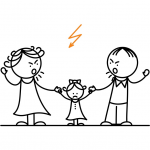
Negative childhood experiences have always been a big topic in psychology and psychiatry, as they tend to be associated with poor mental health outcomes in later life.
Intimate partner violence (IPV) harms not only the adults directly involved in it, but also the children – witnessing IPV as a child is a known risk factor for experiencing IPV and poor mental health as an adult. Exposure to parental depression is also a risk factor for decreased cognitive ability and behavioural problems.
Methods
This cohort study, performed in Indianapolis, Indiana, and published in JAMA Pediatrics, looked at possible links between childhood exposure to parental depression and intimate partner violence (IPV) and subsequent mental health outcomes of the children.
The cohort was recruited from people using healthcare services in four community paediatric health centres. There had to be at least two visits documented in the system: one between the child’s birth and age 36 months, and a second visit between age 37 months and 72 months (6 years).

The study reported that children whose parents reported depressive symptoms were more likely to experience ADHD or receive psychotropic medication
Data were captured from a pre-screening form that parents were asked to complete in the waiting room. It included questions about if their partner had kicked, slapped or hit them and whether they felt safe in their home. To screen for depressive symptoms, it also asked whether they had felt down or depressed or lost interest or pleasure in doing things. In 2010, these questions were changed to whether they’d blamed themselves unnecessarily or felt panicky or anxious in the past seven days. The cohort was divided into four groups according to their answers.
A child was defined as having exposure to IPV if the parent reported it at any time between the child’s birth and age 3, same for depressive symptoms. Of the 2422, 1591 reported neither IPV nor depressive symptoms, 58 reported both, 69 IPV only, and 704 depressive symptoms only. Outcome data were obtained from the county’s medical record system.
Results
The researchers were interested in finding out whether there is a link between exposure to IPV and/or parental depression and children being diagnosed with mental health conditions and/or being prescribed psychotropic medication.
At age 3-6, the following diagnoses were present:
- ADHD – 3.3% of children
- Disruptive behaviour disorder – 8.7% of children
- Anxiety – 0.7%
- Depression – 0.4%
- Sleep problems – 0.3%
- Adjustment disorder – 1.7%

The study found that children of parents who reported IPV were more likely to develop ADHD
48 children (2.0% of the cohort) had been prescribed psychotropic medication. 15 out of 20 of these prescriptions were for ADHD, the others for antidepressants (SSRIs).
There was a statistically significant link between ADHD and parent-reported depressive symptoms compared with no reported depressive symptoms (4.5% vs. 2.8%). Children of parents who reported depressive symptoms were also more likely to receive psychotropic medication (2.9% vs 1.6%).
Children of parents who reported IPV were more likely to develop ADHD (6.3% vs 3.1%).
Conclusions
The authors conclude that this study supports existing literature finding that:
IPV exposure is linked with significant childhood mental health and behavioural concerns.
They suggest that children in families reporting IPV should be screened for mental health conditions and monitored over time.
There are several limitations of this study:
-

The study data on parental depression and IPV was self-reported, which is a significant limitation of this research
First, because the values for IPV and depressive symptom exposure are based on self-reported data, it is likely that not all families where IPV happened were captured. Parents may have left the questions blank for a number of reasons, including safety concerns, and so been classed as non-responders. Also, as the authors state themselves, asking whether people feel safe in their homes isn’t specific enough to capture IPV.
- Secondly, there are a number of confounding factors that were unaccounted for, such as concurrent child abuse, violence between siblings, etc.
- The change of questions on the questionnaire for depressive symptoms during the time period of the study is another limitation.
However, the study also has several strengths:
- Recruiting from community health centres rather than women’s shelters,
- and a cohort rather than a case-control design.
The main take-home message seems to be that exposure to IPV and/or parental depression can be detrimental to children’s mental health, and that screening should be used to identify children who are at risk. I like the suggestion that treatments for parental depression should be part of a child’s treatment plan – in practical terms, there isn’t usually a lot paediatricians can do to stop IPV from occurring, or children from witnessing it, but helping with a parent’s depression is within medical powers.
Link
Bauer NS, Gilbert AL, Carroll AE, Downs SM. Associations of early exposure to intimate partner violence and parental depression with subsequent mental health outcomes. JAMA Pediatr. 2013 Apr;167(4):341-7. doi: 10.1001/jamapediatrics.2013.780.

Cohort study links early exposure to intimate partner violence with poor mental health outcomes, but longer fo… http://t.co/P02huXs2NO
@lisaburscheidt highlights new @JAMAPeds study on early exposure to intimate partner violence & parental depression http://t.co/WN5rDdI0xU
Cohort study links early exposure to intimate partner violence with poor mental health outcomes, http://t.co/k8XB3Ls1v9 via @sharethis
Cohort study finds that children of parents who report intimate partner violence are more likely to develop ADHD http://t.co/WN5rDdI0xU
@Mental_Elf It would be important differentiate ADHD as reactive symptom from a more neurobiological disorder.
New cohort study finds that children whose parents report depressive symptoms are more likely to experience ADHD http://t.co/WN5rDdI0xU
Study finds that children whose parents report depressive symptoms are more likely to receive psychotropic medication http://t.co/WN5rDdI0xU
I appraised an article for @Mental_Elf on intimate partner violence and its effects on childrens’ mental health http://t.co/w4XdeDH2Sg
What fellow NHS librarians get up to via The Mental Elf: http://t.co/xQj0O88nXb via @sharethis
In case you missed it: Study links early exposure to intimate partner violence with poor mental health outcomes http://t.co/WN5rDdI0xU
Mental Elf: Cohort study links early exposure to intimate partner violence with poor mental health outcomes, but… http://t.co/RDoAdn0JD8
Study links early exposure to intimate partner violence with poor mental health outcomes, via @Mental_Elf http://t.co/BQCcxYbk7g
Witnessing partner violence in the family linked with poorer mental health outcomes in children http://t.co/n0vdigoHJL vía @sharethis